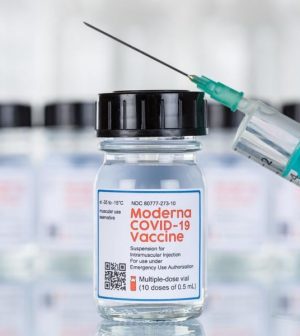- Could Your Grocery Store Meat Be Causing Recurring UTIs?
- Are You Making This Expensive Thermostat Error This Winter?
- Recognizing the Signs of Hypothyroidism
- 10 Strategies to Overcome Insomnia
- Could Artificial Sweeteners Be Aging the Brain Faster?
- Techniques for Soothing Your Nervous System
- Does the Water in Your House Smell Funny? Here’s Why
- Can a Daily Dose of Apple Cider Vinegar Actually Aid Weight Loss?
- 6 Health Beverages That Can Actually Spike Your Blood Sugar
- Treatment Options for Social Anxiety Disorder
COVID Shot Lowers Your Odds for COVID-linked Heart Trouble

While rare, heart-related side effects sometimes follow a COVID-19 vaccine shot, new research shows that’s more than offset by heart-healthy benefits.
Folks who are fully vaccinated are significantly less likely to develop serious heart problems stemming from a COVID infection, the study found.
“The increases in cardiovascular risk we saw following COVID-19 vaccination are temporary, and do not apply to the more serious conditions,” said researcher Fredrik Nyberg, a visiting professor at the University of Gothenburg’s Sahlgrenska Academy in Sweden.
He was referring to some rare, but serious, heart effects that followed individual doses of the COVID vaccine — including inflammation of the heart or the muscle surrounding it.
Nyberg is co-author of the study, published Sept. 30 in the European Heart Journal.
It’s based on data from more than 8 million adults in Sweden who were followed from the start of COVID vaccination in December 2020 until the end of 2022.
Nyberg’s team looked at what are known as “risk windows” — the time immediately after a vaccine shot — dose by dose. They compared heart health in fully vaccinated patients with that in people who, at the same study stage, had no vaccine at all.
They analyzed risk for several diseases — inflammation of the heart muscle or sac surrounding it, arrhythmia, heart failure, transient ischemia attack (TIA, or ‘mini stroke’) and stroke. TIA and stroke are caused by impeded flow of blood to the brain.
The takeaway: “Full vaccination significantly reduced the risk of several more severe cardiovascular outcomes linked to COVID-19, such as heart attack, stroke and heart failure,” Nyberg said in a university news release.
For most outcomes — especially serious ones — the risk of heart-related problems dropped after vaccination, especially after the third dose, the study found.
In general, the risk of heart events after full vaccination was between 20% and 30% lower than with no shot at all.
The study also confirmed the increased risk of cardiac inflammation one to two weeks after a single COVID shot. It also noted a temporary 17% higher increase in risk for extra heartbeats after one dose and 22% higher risk after two doses. The increased risk was stronger in men and older people.
Stroke risk dropped after vaccination, though TIA risk rose temporarily by 13% after one dose, mainly in older men.
The findings, Nyberg said, emphasize “the protective benefits of full vaccination.”
More information
The U.S. Centers for Disease Control and Prevention has answers to frequently asked questions about the COVID-19 vaccine.
SOURCE: University of Gothenburg, news release, Sept. 30, 2024
Source: HealthDay
Copyright © 2026 HealthDay. All rights reserved.










